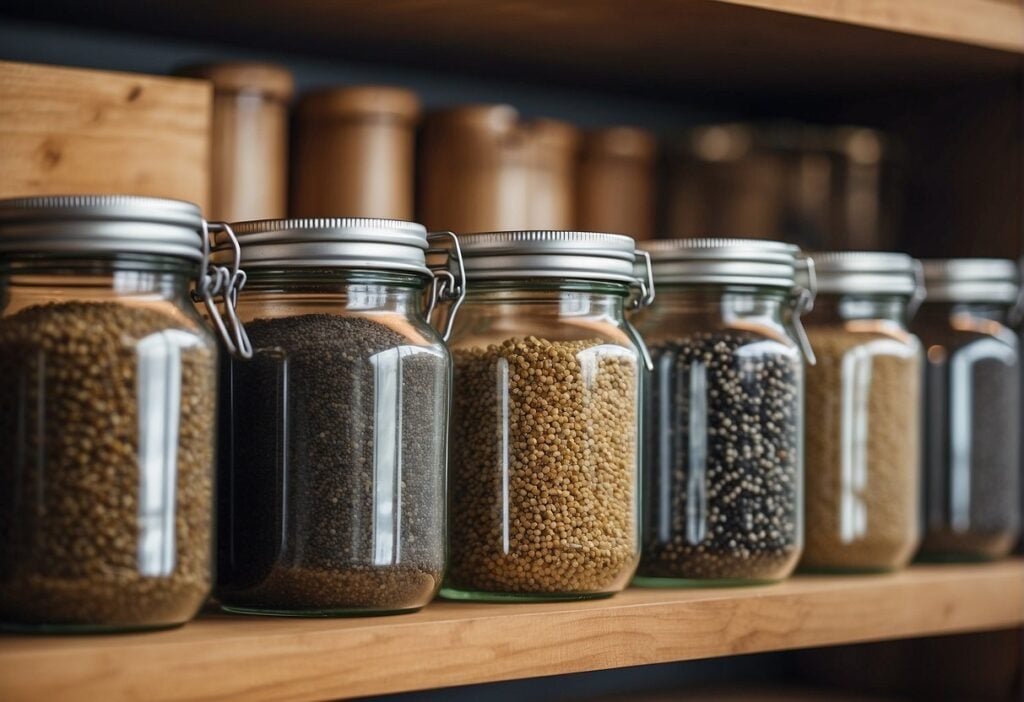Poppy seeds are tiny edible seeds that come from opium poppy pods. They have a pleasant, nutty flavor and are used as a culinary ingredient in many cultures. Poppy seeds are highly nutritious, rich in protein, dietary fiber and healthy fats. However, like other seeds and nuts, poppy seeds can go rancid if not stored correctly.
In this comprehensive guide, we’ll cover everything you need to know about properly storing poppy seeds to maintain freshness and maximize shelf life.
Why Proper Storage is Important for Poppy Seeds
Poppy seeds contain delicate polyunsaturated fats that are sensitive to heat, light and oxygen exposure. Over time, these fats will oxidize and become rancid, leading to unpleasant bitter and metallic flavors
Some signs that poppy seeds have gone bad are:
- Strong bitter, metallic taste
- Unpleasant moldy, musty odors
- Visible mold growth
- Loss of plumpness, seeds appear shriveled
Proper storage is key to preventing rancidity and extending the shelf life of poppy seeds. When stored correctly poppy seeds can remain fresh for up to 1-2 years.
Tips for Storing Poppy Seeds
Follow these tips for optimal poppy seed storage:
Purchase Fresh Seeds
Always try to buy poppy seeds from sources with high turnover to ensure freshness. Check the expiry date and inspect that the seeds look plump and uniform in color Avoid old stock sitting on shelves for long periods
Store in Airtight Containers
After opening the package, transfer poppy seeds to an airtight container like a mason jar or resealable plastic bag. This prevents moisture and air from getting in, which can cause the seeds to spoil faster.
Keep in a Cool, Dry Place
Store poppy seeds in a cool, dry place away from heat, sunlight and humidity. A dark pantry or cupboard is ideal. Refrigeration can extend shelf life slightly but is not required.
Consider Freezing for Long-Term Storage
For storage beyond 6 months, consider freezing poppy seeds. Place them in an airtight freezer bag or container, removing as much air as possible. Frozen properly, poppy seeds can retain optimal quality for 2-3 years.
Check Regularly for Freshness
Check stored poppy seeds periodically for signs of moisture, mold growth or rancidity. Discard any that have gone bad. Write the purchase date on containers for reference.
How to Store Poppy Seeds After Opening
After opening a package of poppy seeds, it’s important to re-seal or transfer them properly for storage:
-
Transfer seeds to an airtight glass, plastic or metal container. Mason jars work great.
-
Ensure the container has a tight fitting lid to keep out air and moisture.
-
Remove as much excess air as possible before sealing.
-
Store the container in a cool, dry place like the pantry. Refrigeration is optional.
-
Check seeds regularly for freshness and use within 6-12 months for best flavor.
-
For long-term storage, freeze poppy seeds in airtight containers.
Other Tips for Keeping Poppy Seeds Fresh
Here are some other tips to help maintain poppy seed freshness and shelf life:
-
Consider buying whole poppy seed pods and removing the seeds yourself rather than pre-packaged seeds. The pods protect the seeds from light, air and moisture.
-
When measuring out seeds for recipes, use clean, dry utensils to avoid introducing moisture.
-
Don’t repeatedly open and close the storage container, which lets in air. Remove only what you’ll use immediately.
-
If seeds lose some freshness but aren’t rancid, try roasting briefly in the oven at 300°F to revive flavor and aroma before use.
-
Store different seed varieties separately to prevent flavor transfer. Label containers.
-
Keep storage containers in a dark, dry area. Heat, light and humidity hasten spoilage.
Storing Poppy Seeds for Planting
For poppy seeds saved for planting:
-
Allow seed pods to fully mature and dry on the plant before harvesting
-
Further dry seeds for 1-2 weeks in open air out of direct sunlight
-
Place seeds in sealed, airtight glass jars or envelopes and store in the refrigerator
-
For long term storage, keep seeds in the freezer
-
Label containers with variety and year harvested
-
Viability decreases over time but most seeds remain viable for 3-4 years if stored properly
Enjoy Your Poppy Seeds!
Stored correctly, poppy seeds will retain their signature sweet and nutty flavor for many months, or even years. Follow these tips to keep your poppy seeds fresh. And remember to check regularly for any signs of moisture, mold or rancidity. Enjoy this versatile culinary ingredient in breads, desserts, salads and more!
How to Save Poppy Seeds Gardening
FAQ
Do poppy seeds need to be refrigerated?
What is the best way to store poppy seeds?
How do I save poppy seeds for next year?
Should you put poppy seeds in the freezer?
Where to buy Unwashed poppy seeds?
The consumer market of unwashed poppy seeds has been getting supplies from many sources. Formerly, eBay was the central place to find good unwashed poppy seeds. Today we explore and investigate the list of available sources including Amazon, eBay, Etsy, and other online stores of unwashed seeds for the modern-day customer.
What is the nutritional value of poppy seeds?
Poppy seeds, known as khus khus in Hindi, contain good amounts of minerals like calcium, potassium, magnesium and iron.
Do all poppy plants contain opium?
Americans Should Think Twice Before Buying From These 2 Stores. It’s a bigger problem than you might think (the ugly truth). Not all poppy plants contain opium. The opium poppy (Papaver somniferum) is the plant species that is most commonly used to produce opium.
- A Complete Guide to Caring for Yuki Cherry Blossom Shrub - January 23, 2025
- Identifying Red Hot Poker Seeds: What to Look For When Harvesting Torch Lily Pods - January 23, 2025
- A Complete Guide to Harvesting Evening Primrose Seeds - January 23, 2025

